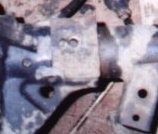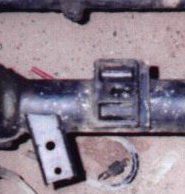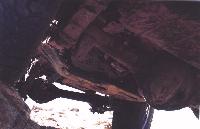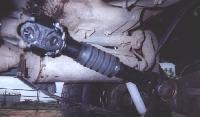The benefits of swapping in axles for the Jeep YJ are definitely worth
the effort. Although I did not do a spring over conversion at the time
of my axle swap, incorporating one would be possible. If you are
planning on an SOA set up in a YJ, swapping in larger axles is an
excellent idea especially considering that most SOA Jeeps I've seen are
running 35 inch tires.
After seeing the size difference in components, as well as the
"effectiveness" of C clip axles, I would make the removal of the
Dana 35C a must in an SOA conversion.
Why swap to Dana 44s? The Dana 44s are significantly stronger than
the stock YJ axles in all ways including shaft diameter, shaft spline
count, ring and pinion size, and axle housing size. Getting rid of
the Dana 35C is one of the best things you can do to a Chrysler
Jeep.
Another advantage of swapping in a Dana 44 up front is it gives you
something no YJ saw from the factory, manual hubs. Not just any hubs
though, beefy 1/2 ton truck hubs. The tie rod is out of the way on
top of the knuckles. The six lug wheel bolt pattern is stronger than
the five and they look cool too. The brakes will see a substantial
increase in size, front and rear.
Beginning The Swap
The swap I did involved a Wagoneer/Cherokee (SJ)
front end, and a Scout II rear end. The widths of both these axles
are compatible and very similar to the dimensions of the stock YJ
axles. There are 2 widths available in the SJs, the narrow track
version is closer to the right width. The narrow track Wagoneer
and Cherokee Jeeps lacked extensions on the fenders. You will
find both right, and left hand drop differentials on these axles.
The stock YJ has the diff on the driver's side. If you are
keeping your original transfer case, a compatible front end must
be found.
When I performed my swap I opted to install the venerable Atlas II
transfer case. If one wishes to incorporate a D300 transfer case
into the swap, and get rid of the NP231, now is decision time. The
CJs had diffs on the passenger side. Benefits include: longer drive
shaft, GEARED Tcase, and IMO a better unit than the 231. As mentioned
I did not install the D300. If you are interested in swapping in a
Dana 300, check out Larry Soo's
axle and transfer case conversion article.
It wasn't until 1974 when Cherokees and Wagoneers started using the
open knuckle Dana 44 that makes good swap material. Open knuckle
axles allow a vehicle to have a better turning radius. The Wagoneers
had disk brakes standard, but they were optional on the Cherokees
until 1976.
The pinion on the D35C axle is not perfectly centered, it is off set
just a bit to the passenger side. Because the use of a CV type drive
shaft is just about guaranteeded on any lifted YJ, this pinion offset
must be copied on the donor axle. The Scout D44 width is close enough
to that of the YJ, and has the same pinion offset. In addition the
axle is built in a way allowing both the left and right side rear
axle shafts to be identical - bonus!
Matching Wheel Bolt Patterns
The descision for matching up the wheel pattern on the two axles had two
possible solutions: make the front match the rear, or make the rear
match the front. On the swap I performed I had the rear lug pattern
re-drilled to match the front.
I sent the shafts to Mosier and they charged $50/pair to weld/redrill
the axle shafts and I guess the round trip cost me another $25 in
shipping. It was quick and painless. I used Scout brake parts and
Drums from a Cherokee. The part number is the same from 78 to 82 for
the rear drums. I used non finned drums. The inside inner edge on the
new drums are raised quite a bit, and contacts the metal edge of the
brake shoes. When you have your drums turned, turn the
bit into this lip a bit.
Swapping The Front Axle
 The spring perches on the SJ axle are 1 inch farther apart than the
spring perches on the YJ. This means each spring perch needs to come
1/2 inch inboard. The drivers side is the tricker side sine the spring
perch is integrated into the diff housing. Grind into the differential
housing webbing 1/2 inch as shown in the blurry picture to the
right. Fill in the gap with some steel and fill the king pin hole
with weld. Grind the welds smooth and redrill the king pin hole
1/2" in from the original location.
The spring perches on the SJ axle are 1 inch farther apart than the
spring perches on the YJ. This means each spring perch needs to come
1/2 inch inboard. The drivers side is the tricker side sine the spring
perch is integrated into the diff housing. Grind into the differential
housing webbing 1/2 inch as shown in the blurry picture to the
right. Fill in the gap with some steel and fill the king pin hole
with weld. Grind the welds smooth and redrill the king pin hole
1/2" in from the original location.

|
The passenger side is easier since there is only a spring perch.
I used some 1/2 inch thick steel plate and welded in next to the
the inner part of the spring perch. The nice part about this
swap is it is not necessary to cut off the spring perch and
remount it. The king pin also gets redrilled 1/2" to the inside,
measure twice and drill once.
|
U-Bolts
Make sure you use rod for cast material when you weld the perch
widening pieces. You also will need to grind at each spring perch to
clear the Ubolts, and drill a hole trough differential webbing on the
inside U-bolt for the U-bolt to go through. You will need to get
larger U-bolts for the drivers side because the U-bolts run over
the cast iron section use SJ U-bolts or have your local spring
shop make you some. The SJ U-bolt plates can be used for the swap
since the U-bolt size is different from the Dana 30 U-bolts, but
the spring width is the same.
Sway Bar, Track Bar, and Shocks
The SJ U-bolt plates are handy because they have the sway bar pins
on them, and your sway bar will match up perfectly when you use
these. The original SJ shock mounts brackets on the D44 work with
the Wrangler shocks.
Steering
The stock YJ pitman arm is retained. The steering linkage will
match up fine if you have the pitman arm machined (conical hole)
to fit the SJ drag link. Because the tie rod is on top of the
knuckles on the D44, a drop pitman arm is not used and the tie
rod is more up out of the way.
Front Drive Shaft
 Since I had a shackle reversal, I had a custom front drive shaft
with extra up-travel built. Another guy, Kerry, who did this
swap without doing the shackle reversal said that the front
driveshaft from a 2.5L AX5 YJ is the perfect length - it's
about an inch shorter than the 4.0L AX15 driveshaft. Depending
on your suspension you may not need drive shaft modifications.
Since I had a shackle reversal, I had a custom front drive shaft
with extra up-travel built. Another guy, Kerry, who did this
swap without doing the shackle reversal said that the front
driveshaft from a 2.5L AX5 YJ is the perfect length - it's
about an inch shorter than the 4.0L AX15 driveshaft. Depending
on your suspension you may not need drive shaft modifications.
Brakes
I used all the brakes hardware from the SJ the axle, but the lines
on my YJ were not compatible. Stainless lines for a CJ worked had
the right ends though and the bolted right in place of my old YJ
brake hose. It took longer to throw new pads then to replace the
lines. The YJ master cylinder works well enough, but it has
more travele and they are harder to bleed. I'm running my stock
master cylinder until I can find a bolt-in replacement with a
larger bore.
Swapping in the rear axle:
The rear axle is simple, remove the old spring perches and weld the
new ones on. I obtained some inexpensive Confer perches from my
local 4x4 shop. One can also use adjustable perches, but these are
cheaper. With the Jeep raised, I installed the axle sitting loosely
on the spring perches and loosely bolted to the springs. I made sure
the axle was centered by measuring from the axle end to the outside
edge of the spring. When the numbers matched, I set the pinion angle
and welded it up. If you are using a CV style drive shaft, point the
pinion just below the center of the output on the transfercase. One
can use special tools, but My eyeball job worked well. I haven't
had any drive line vibration and you could use shims to fine-tune it
if there is a problem.
Shocks
I removed the original shock mounts from the Dana 35c axle and welded
them onto the D44 tubes. This works well or I could have bought some
generic shock mounts and welded them on.
U-Bolts
I will be flipping my rear U-bolts using Toyota Spring plates and
square U-bolts. For now, I used the Scout U-bolt plates and Scout
size U-bolts.
Brakes
I used the YJ hard lines and brake hose on the Scout II axle. The
side which the hard-line drops from the frame rail to the axle is
opposite from the Scout, so a hole was drilled and tapped on the
correct side of the axle tube. The YJ hard-line on the D44 axle
threaded into the wheel cylinders. The Dana 35c emergency brake
cables were used.
Rear Drive Shaft
 Since I installed an Atlas transfercase at the same time, I had a
rear CV type driveshaft custom made. If you were to keep the NP231
transfer case, it all depends on what year YJ you have. Some Wranglers
use the same size U-joint as the Scout and some use a different size.
I'm unsure when the change occured.
Since I installed an Atlas transfercase at the same time, I had a
rear CV type driveshaft custom made. If you were to keep the NP231
transfer case, it all depends on what year YJ you have. Some Wranglers
use the same size U-joint as the Scout and some use a different size.
I'm unsure when the change occured.
Conclusion
I have a 4 inch Rubicon Express lift with the UpWarrior shackle
reversal. I have no wander, bump steer, or tire wear that I have
noticed. I left out the trac bar and have had no problems.
Other things need to be considered when making the swap such as
gearing, wheels, oil, and all the other odds and ends.
Please keep in mind that the opinions expressed are my own. I
also would like to warn the reader that an axle swap is not as
easy a bolting on nerf bars. This task requires fabrication
and welding skills, a good eye, time and money. What else you
incorporate into the swap also affects all these factors. I
am simply providing information regarding my experiences while
swapping the axles.